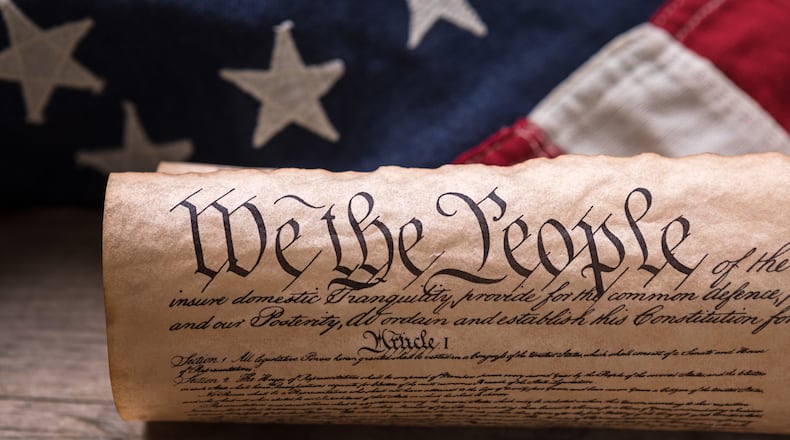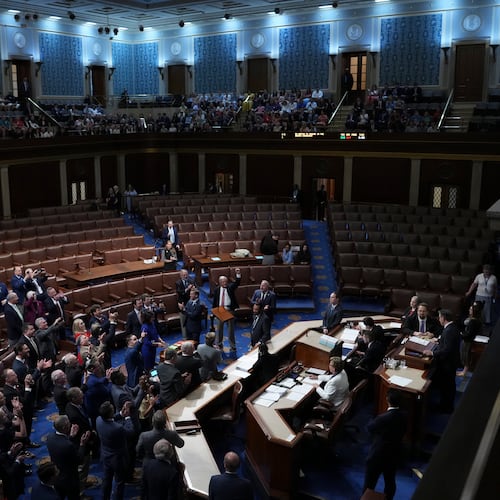December 6, 1865 is a prominent date in American history because on that date, Georgia ratified the 13th Amendment, which abolished slavery in the United States. Georgia’s ratification meant that the constitutional threshold of three-fourths of the states — 27 out of 36 — had been satisfied and thus, the 13th Amendment became law that day.
And now, Georgia once again brings prominence to December 6 by conducting a runoff election between two African American descendants of slaves. The date of that runoff invites recognition of the historical role that Georgia played in making the 13th Amendment the law 157 years ago.
The 13th Amendment, passed by Congress on Jan. 31, 1865, was ratified by the states over the course of the waning months and immediate aftermath of the Civil War. It abolished slavery in the United States by granting “legal” freedom from chattel slavery to over 4 million enslaved people.
Credit: contributed
Credit: contributed
Despite the importance of the ratification of the 13th Amendment, December 6 — Abolition Day — passes each year with little fanfare. Instead, two other historical events are more widely recognized for ending slavery – the Emancipation Proclamation and Juneteenth. While significant dates to remember, neither marked the end of slavery in America – that distinction lies solely with the enactment of the 13th Amendment.
The Emancipation Proclamation began as a threat made by President Abraham Lincoln on Sept. 22, 1862, to free all the enslaved people in the states rebelling against the Union if those states did not return to the Union in 100 days. None did, and as a result President Lincoln issued the Proclamation on Jan. 1, 1863. But that Proclamation purportedly freed only those enslaved people where the Union achieved military victories. And, it did not apply to the slaves in non-rebelling states. That’s why President Lincoln himself “recognized that the Emancipation Proclamation would have to be followed by a constitutional amendment in order to guarantee the abolishment of slavery.”
The date now celebrated as Juneteenth National Independence Day also shows the Proclamation’s limits. On June 19, 1865 — two and a half years after the Emancipation Proclamation — Maj. Gen. Gordon Granger issued a General Order noting that, in accordance with the Proclamation, enslaved people in Texas were legally free. Yet in the order, Gen. Granger stated that “[t]he freedmen are advised to remain quietly at their present homes and work for wages. They are informed that they will not be allowed to collect at military posts and that they will not be supported in idleness either there or elsewhere.”
In other words, “freedom” meant staying “quietly” with your previous “master” and hoping that he paid you the wages you were owed. And for many enslaved people, even that reduced version of freedom was elusive. Many masters delayed telling their enslaved population about Granger’s order, or the Proclamation on which it was based, until after the annual harvest. But those questionable origins turned into a time for celebration: a year later, formerly enslaved people in Texas celebrated the end of slavery on a day now recognized as the Juneteenth National Independence Day.
Still, neither a wartime presidential proclamation nor an order issued by an Army general ended the legality of slavery in America. Instead, Georgia made that happen on Dec. 6, 1865, when it ratified the 13th Amendment.
The Constitution explicitly assumed — and therefore blessed — the existence of slavery: for example, in the notorious “three-fifths” clause in Article I, Section 2. Only a constitutional amendment could undo that assumption and bar slavery permanently within the United States.
The Constitution embodies the sovereign will of our nation. It sets forth the law by which all Americans are ruled. It is the foundational fabric of our democracy — the Rule of Law that shapes the construct of our society. The 13th Amendment moved our nation closer to the ideal espoused in our Declaration of Independence that “all men are created equal.”
And this year, on the same date, and in the state where the constitutional amendment abolishing slavery was finally fully ratified on Dec. 6, 1865, a runoff election will be held between two African American descendants of slaves.
How fitting is that for celebrating Abolition Day in America?
James Andrew Wynn is a judge on the U.S. Court of Appeals for the Fourth Circuit, based in Richmond, Va. The court hears appeals from federal district courts in Maryland, Virginia, West Virginia, North Carolina and South Carolina and from federal administrative agencies.
About the Author
Keep Reading
The Latest
Featured




